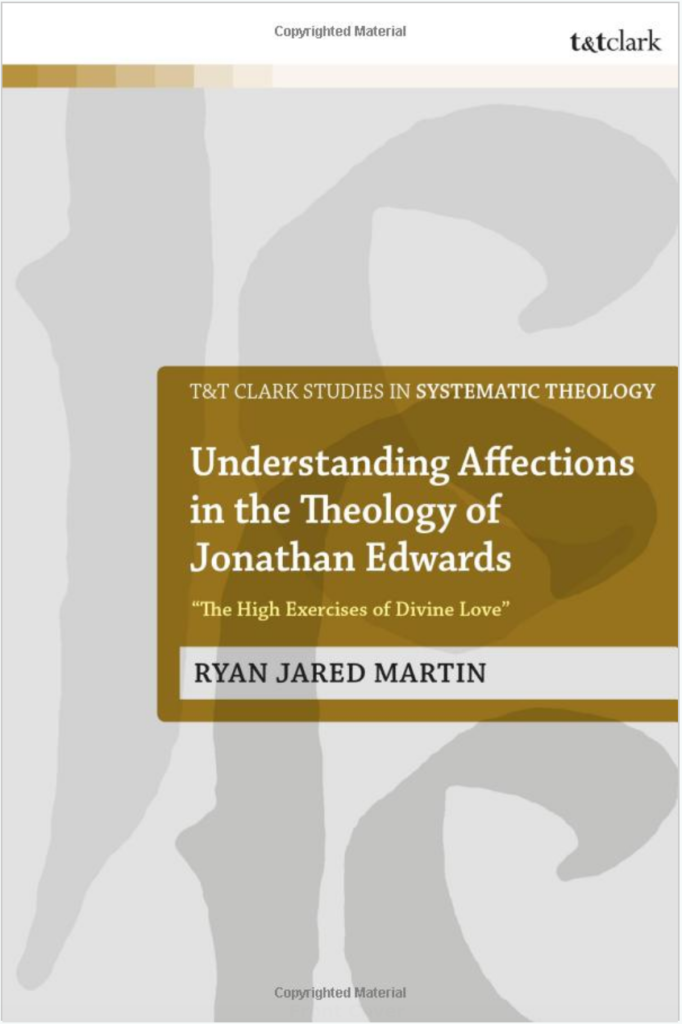Book Review — Ryan J. Martin, Understanding Affections in the Theology of Jonathan Edwards: “The High Exercises of Divine Love.”
Ryan J. Martin, Understanding Affections in the Theology of Jonathan Edwards: “The High Exercises of Divine Love.” T&T Clark Studies in Systematic Theology (New York: T&T Clark, 2019). xi + 281 pp. $122 (USD)
In this book, originally written as his doctoral dissertation, Ryan Martin aims to correct what he sees as common misinterpretations of Edwards’s thought on the affections.
The first chapter offers a veritable encyclopedia of sources from authors who have either equated Edwards’s term “affections” with the modern term “emotions,” or have claimed that Edwards owed his affective psychology to John Locke. Martin argues that both interpretations are incorrect: Edwards’s affective psychology came from the Christian tradition alone.
Chapters two and three trace the development of Christian thinking on the affections through patristic, medieval, Reformation, and Reformed/Puritan sources. Martin concludes that “most contemporary understandings of emotions have little in common with the portrait of affections and passions” found in the Christian tradition (p.88). While emotions are generally defined as feelings in the body, Christianity has defined “affections” and “passions” as movements of the soul, specifically of the will, directed “toward or away from rational or spiritual good and evil” (p.88).
Chapters four through seven survey the works of Jonathan Edwards in chronological order. Martin reveals that Edwards’s understanding of affections and passions remained consistent throughout his life, and were in harmony with the historic Christian tradition. This leads him to conclude that any interpretation of Edwards which attempts to equate “affections” with “emotions,” or to trace Edwards’s affective psychology to Locke, are misguided. As he writes, “Edwards explicitly rejected the idea that affections are intrinsically corporeal . . . cautioned against making much of the bodily effects of the affections” and carefully distinguished between affections and passions (p.230).
The final chapter, “Toward a Theology of Affections,” is an attempt at theological retrieval. Martin writes, “Human beings, and especially Christians, are not better off having forgotten these distinctions [i.e. the distinctions between affections, passions, and emotions] . . . Edwards’s thought calls believers to return to spiritual affections as the cornerstone of Christian piety . . . Edwards’s thought also calls for a return to ethics and morality, and for those systems to consider the distinction between higher and lower desire . . . Christians today would do well to model such courage and clarity of thought” (p.237-38).
Martin’s work would have been more compelling had he spent additional time tracing the origin, development, and current usage of the term “emotions.” Even so, he makes a strong case that affections and passions as understood by the historic church, and especially Jonathan Edwards, are categorically distinct from the modern concept of emotions, and that Edwards’s use of the terms traces back through the Christian tradition rather than through Locke.
Martin’s work will be particularly valuable to two groups of people: Edwards scholars and Edwardsean pastors. Armed with Martin’s research, scholars will want to exercise caution before interpreting Edwards’s affective psychology through the grid of modern psychological categories. Similarly, Edwardsean pastors will want to exercise caution before citing the theologian to justify their contemporary ministry practices. It may be that some of those practices, designed as they are to stir the “emotions,” might just be what Edwards was warning against.
